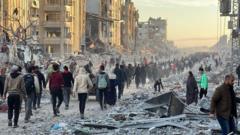In the wake of a recently established ceasefire, Palestinians in Gaza have begun to return to their neighborhoods, where they are confronted with scenes of destruction. Jubilation that initially filled the streets of Gaza soon gave way to despair as families faced the ruins of their homes. In Jabalia, which houses the largest refugee camp in the region, footage shared by residents depicted entire blocks reduced to rubble. Duaa al-Khalidi recounted her tragic experience, having emerged alive with her daughters but left to mourn her deceased husband, mother-in-law, and sister-in-law, still buried beneath the debris of their home. "I want nothing but their bodies so I can bury them with dignity," the 28-year-old lamented.
The Jabalia camp has been deeply affected by the conflict, suffering extensive loss as the site of one of the most violent Israeli operations, leading to approximately 4,000 Palestinian deaths, per reports from the Hamas-run health ministry.
Another resident, Hussein Awda, who lost ten family members, reflected on his return to Jabalia. He shared his sorrow over the loss of loved ones and the destruction of his property, stating, "The war killed everything beautiful inside us." Despite moments of public embrace and celebration, many residents, including Gaza City resident Ahmed Abu Ayham, expressed sentiments of grief. Abu Ayham described his home city as "dreadful," asserting that it is a time to mourn rather than rejoice.
Amidst the returning evacuees was Mohammed Suleiman in Rafah, expressing relief at the ceasefire news but fearing for lasting peace. "God willing, things will change for the better," he said. However, the tenuous nature of the ceasefire was quickly underscored by Israeli airstrikes reported during the agreement's early hours that resulted in further casualties.
As humanitarian aid trucks begin to enter Rafah, the emotional and physical scars of the conflict remain deeply ingrained in the lives of Gazans, alongside a pervasive fear of the ceasefire's potential collapse.
The Jabalia camp has been deeply affected by the conflict, suffering extensive loss as the site of one of the most violent Israeli operations, leading to approximately 4,000 Palestinian deaths, per reports from the Hamas-run health ministry.
Another resident, Hussein Awda, who lost ten family members, reflected on his return to Jabalia. He shared his sorrow over the loss of loved ones and the destruction of his property, stating, "The war killed everything beautiful inside us." Despite moments of public embrace and celebration, many residents, including Gaza City resident Ahmed Abu Ayham, expressed sentiments of grief. Abu Ayham described his home city as "dreadful," asserting that it is a time to mourn rather than rejoice.
Amidst the returning evacuees was Mohammed Suleiman in Rafah, expressing relief at the ceasefire news but fearing for lasting peace. "God willing, things will change for the better," he said. However, the tenuous nature of the ceasefire was quickly underscored by Israeli airstrikes reported during the agreement's early hours that resulted in further casualties.
As humanitarian aid trucks begin to enter Rafah, the emotional and physical scars of the conflict remain deeply ingrained in the lives of Gazans, alongside a pervasive fear of the ceasefire's potential collapse.
















